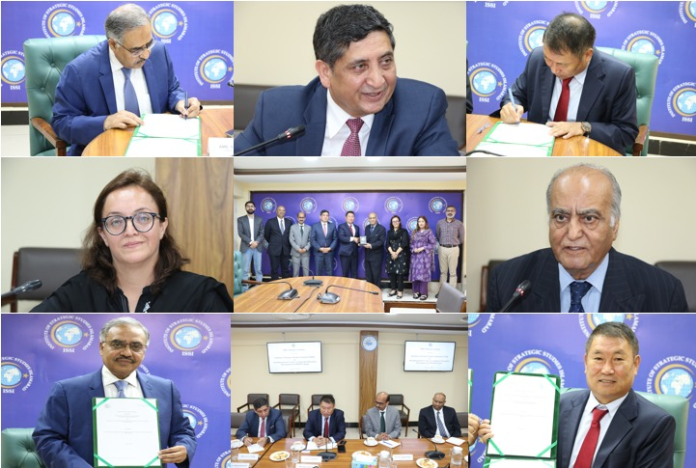ISLAMABAD, Jul 24 (APP/DNA):Further strengthening its international partnerships, the Institute of Strategic Studies Islamabad (ISSI) has signed a Memorandum of Understanding (MoU) with the International Centre for Integrated Mountain Development (ICIMOD), Nepal.
The MoU was signed by Ambassador Sohail Mahmood, Director General, ISSI and Dr Pema Gyamtsho, Director General, ICIMOD. The signing was attended by Ambassador Abrar H Hashmi, Pakistan’s Ambassador to Nepal, and senior colleagues from ISSI and ICIMOD, said a press release here.
ICIMOD plays a pivotal role in combating climate change by promoting regional collaboration among the eight-member countries of the Hindu Kush Himalaya (HKH) region, including Afghanistan, Bangladesh, Bhutan, China, India, Myanmar, Nepal and Pakistan.
As a precursor to this collaboration, the Centre for Strategic Perspectives (CSP) at ISSI hosted a fruitful in-house session with Dr. Pema Gyamtsho, Director General, ICIMOD.
The discussion entailed an in-depth exchange of ideas on shared research priorities, regional challenges, and opportunities for institutional collaboration. This engagement helped further outline the contours of future collaboration, reaffirming reaffirmed the strong alignment between ISSI’s focus and ICIMOD’s mission.
Specifically, the two sides shared an overview of the priorities of both institutions, aligning them with national climate priorities of not only Pakistan and Nepal but the whole region. The deliberations by two sides focused on the urgent need for regional cooperation to address the escalating impacts of climate change, particularly in Hindu Kush Himalaya (HKH). Both sides acknowledged the importance of enhancing institutional capacities to respond to challenges such as glacial lake outburst floods (GLOFs), air pollution, and Indus river basin degradation.
The discussion also emphasized the critical role of knowledge-sharing and data exchange. The two institutions agreed to collaborate on joint research, policy dialogues, and capacity-building programs targeting climate risk mitigation. Special attention was given to the need for inclusive engagement by bringing together not only governments and institutions, but also civil society, academic networks, and regional stakeholders.
The meeting concluded with the understanding that there was an urgent need for moving beyond national silos to adopt a transboundary approach and recognize that climate change and environmental threats do not respect political boundaries. Recommendations included integrating and adopting to early warning systems, disaster preparedness, and introducing culturally relevant preventive strategies into national and regional planning.

















